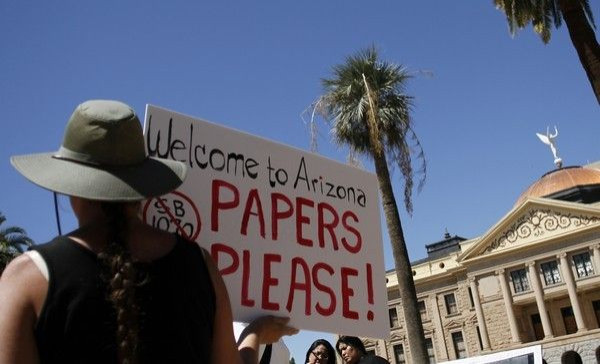Supreme Court Meets to Review Arizona Immigration Law Case

The U.S. Supreme Court on Friday met in private to discuss accepting Arizona's case with the Department of Justice over the state's tough immigration law.
The Obama administration has had success in arguing that Arizona's law is an unconstitutional breach of federal authority. Now, the battle has turned to the Supreme Court and whether the case is appropriate for the justices to handle.
The high court will likely announce Monday if Arizona's case made the cut.
The lawsuit is one of several filed against several states for passing laws that aim to make life difficult for illegal immigrants, resulting in self-deportation. The Obama administration says the federal government has authority over immigration regulation. Arizona argues the law allows the state to address an immigration problem the administration is unable to control by enforcing federal immigration laws.
Federal courts have put the brakes on several provisions of Arizona's law, known as SB1070, prompting the state to petition the Supreme Court. Arizona said its case goes to the heart of America's system of federalism because states take the brunt of the problems caused by a failure to enforce federal immigration laws.
Taking up the case would resolve other states facing Justice Department lawsuits over similar immigration laws passed in Utah, South Carolina and Alabama, Arizona argued.
But those lawsuits have yet to go through the appeals process. Arizona's case was the first to receive a decision from an appeals court, which upheld a preliminary injunction on several of the law's provisions.
Obama's top Supreme Court lawyer, Solicitor General Donald Verrilli, said it would be premature for the justices to accept Arizona's petition. While the state laws are similar in style and intended effect, the Obama administration says they are not carbon copies of each other.
There is no reason to think that reviewing this preliminary injunction would resolve those cases--much less resolve any conflict in the courts of appeals on the relevant issues, because none exists, not even at the petition's broad level of generality, Verrilli wrote in November.
Arizona said in its response the spate of Justice Department lawsuits against these states underscores the need for the Supreme Court to enter the mix.
The proliferation of highly unusual efforts by the federal government to enjoin duly-enacted state statutes, perhaps more clearly than any other development, underscores the need for this court's review, Arizona's brief said.
A federal district court in Arizona had ordered a preliminary injunction on four of SB1070's provisions, citing the Justice Department's likelihood of success in proving that federal immigration laws preempt the state's regime.
This injunction has blocked a requirement that police officers determine the immigration status of anyone arrested or detained and a provision authorizing warrantless arrests of any undocumented resident who had committed a public offense, even outside Arizona. A provision that makes failure to carry immigration documents or seek work a state crime was also blocked.
© Copyright IBTimes 2025. All rights reserved.




















